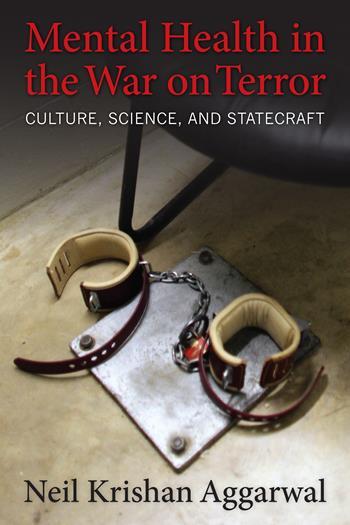National Security Above Mental Health — Neil Aggarwal
“We need novel solutions for hierarchical organizations such as the CIA and the armed forces that erect institutional safeguards for psychiatrists, psychologists, and whistleblowers warning of misuses in mental health knowledge and practice.”—Neil Krishnan Aggarwal
This week our featured book is Mental Health in the War on Terror, by Neil Krishan Aggarwal. Throughout the week, we will be posting content from and about the book and it’s author. Today, we are happy to repost an article on the Senate Select Committee on Intelligence’s report on American use of torture, written by Aggarwal and originally posted in mid-December.
Don’t forget to enter our book giveaway for Mental Health in the War on Terror!
The Senate Select Committee on Intelligence’s release of the report Committee Study of the Central Intelligence Agency’s Detention and Interrogation Program marks a signature moment for government accountability in the War on Terror. The report acknowledges that “the CIA’s use of its enhanced interrogation techniques was not an effective means of acquiring intelligence or gaining cooperation from detainees” and “the CIA’s justification for the use of its enhanced interrogation techniques rested on inaccurate claims of their effectiveness.”
Politicians have debated release of the report. Former Vice-President Dick Cheney has claimed that enhanced interrogation techniques were “absolutely, totally justified” and were the “right thing to do, and if I had to do it over again, I would do it.” In contrast, Senator Dianne Feinstein, committee chairwoman, defended the release: “Releasing this report is an important step to restoring our values and showing the world that we are a just society.” Similarly, President Barack Obama declared: “The report documents a troubling program involving enhanced interrogation techniques on terrorism suspects in secret facilities outside the United States.”
In Mental Health in the War on Terror: Culture, Science, and Statecraft, I investigate how the government uses mental health professionals to advance national security interests and how mental health professionals serve such ends. I examine bioethical debates on whether mental health professionals should do no harm or participate in interrogations. I examine debates among prosecution and defense teams on the meanings of detainee mental health symptoms in Guantanamo tribunals. I conclude that the War on Terror has pushed American government officials to treat terrorism as a military problem requiring new forms of mental health knowledge, practice, and institutions rather than a law enforcement problem handled through extant institutions.
The Senate committee’s report reinforces this conclusion. After capture of militant Abu Zubaydah, a psychologist-contractor proposed in July 2002 that SERE (Survival, Evasion, Resistance and Escape) techniques from the American military could be “novel interrogation methods” for the CIA. These techniques include walling, facial holding and slapping, cramped confinement, stress positions, sleep deprivation, waterboarding, and mock burial. One CIA official clarified that “personnel will make every effort possible to insure [sic] that subject is not permanently physically or mentally harmed but we should not say at the outset of this process that there is no risk.” The psychologist-contractors normalized these techniques, responding, “The safety of any technique lies primarily in how it is applied and monitored.”
After obtaining approval, the CIA implemented enhanced interrogations. The report states: “From August 4, 2002 through August 23, 2002, the CIA subjected Abu Zubaydah to its enhanced interrogation techniques on a near 24-hour-per-day basis.” We learn that “over the course of the entire 20 day ‘aggressive phase of interrogation,’ Abu Zubaydah spent a total of 266 hours (11 days, 2 hours) in the large (coffin size) confinement box and 29 hours in a small confinement box which had a width of 21 inches, a depth of 2.5 feet, and a height of 2.5 feet.” Additionally, “Abu Zubaydah frequently ‘cried,’ ‘begged,’ ‘pleaded,’ and ‘whimpered,’ but continued to deny that he had any additional information on current threats to, or operatives in, the United States.” CIA staff monitoring the interrogations indicated that “it is visually and psychologically very uncomfortable,” that “several on the team profoundly [were] affected… some to the point of tears and choking up,” and “’two, perhaps three [personnel are] likely to elect transfer’ away from the detention site if the decision is made to continue with the CIA’s enhanced interrogation techniques.” Even though enhanced interrogations did not produce any more information from Abu Zubaydah, “CIA Headquarters informed the National Security Council that the CIA’s enhanced interrogation techniques used against Abu Zubaydah were effective and were ‘producing meaningful results.’”
This brief example reinforces central themes in cultural studies of mental health. First, the psychological contractors developing enhanced interrogation techniques allied themselves with the interests of the state rather than socially undesirable populations – in this case, detainees. Ever since the Nuremberg trials publicized Nazi physician violations during World War II, health professionals have heeded the call to do no harm. This code certainly challenges health professionals treating enemies during war, but remains nonetheless operational. Second, many innovative mental health practices come from previous military experience. Some of our best treatments for Posttraumatic Stress Disorder and Traumatic Brain Injury come from experience with veterans. Mental health abuses can also emerge from the military such as SERE techniques for enhanced interrogations. This strengthens the case for why military and intelligence mental health professionals should resist doing harm during wartime.
Once the dust settles, I hope that our government interviews the brave intelligence officers and government officials who objected to psychologically enhanced interrogations. Invoking international treaties and precedents to prevent abuses from health professionals has not worked thus far. We need novel solutions for hierarchical organizations such as the CIA and the armed forces that erect institutional safeguards for psychiatrists, psychologists, and whistleblowers warning of misuses in mental health knowledge and practice. More soon.




